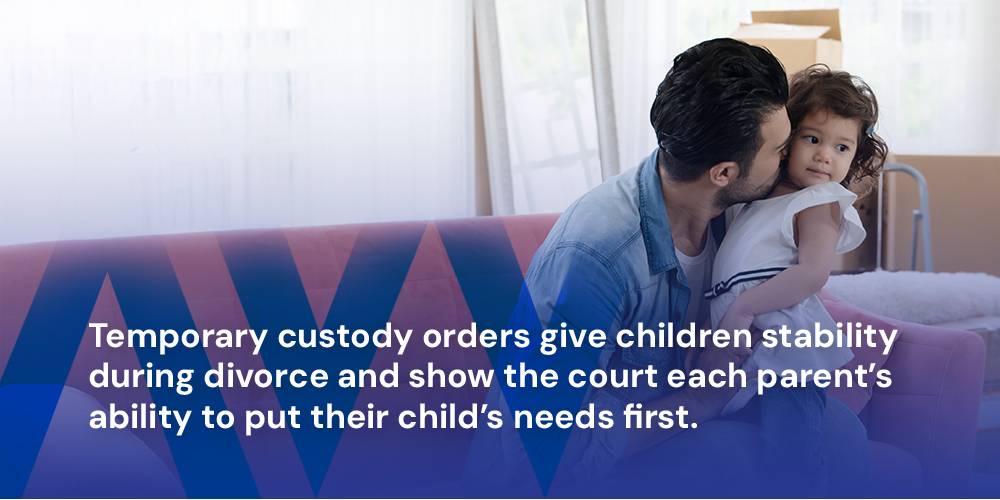Understanding Temporary Custody Orders
 When a couple with minor children decides to divorce, setting up a parenting plan for the children is one of the most stressful parts of the process. No matter what the parents want, in Illinois, the court’s goal is to try to make sure that children stay in regular contact with both parents.
When a couple with minor children decides to divorce, setting up a parenting plan for the children is one of the most stressful parts of the process. No matter what the parents want, in Illinois, the court’s goal is to try to make sure that children stay in regular contact with both parents.
However, before a divorce is final, the chaos of the process may mean that children do not have a clear and consistent living arrangement. One parent may move out of the family home, or there may be an order of protection or other complications.
In such cases, a temporary custody order can protect children while parents work through the divorce. Temporary orders are designed to create stability and predictability for children. The goal is to ensure that a child’s day-to-day needs are met during a highly stressful time.
Working with an experienced Batavia child custody attorney can help the entire divorce process be more predictable. If you are hoping to get a temporary custody order, talk to us today by calling 630-409-8184 and scheduling a free consultation.
What Is a Temporary Child Custody Order in Illinois?
A temporary child custody order is a short-term legal arrangement that sets up custody and visitation while a divorce is ongoing. Note that Illinois law now calls custody "parental decision-making authority." Visitation is now "parenting time." We will use these terms interchangeably in this blog.
Temporary orders are intended to look after the immediate needs of the children and are not permanent. Once the divorce is finalized and the parents agree on a long-term parenting plan, the temporary order is replaced by the final custody arrangement.
During the temporary period, courts want to make children’s lives as predictable and stable as possible. This includes trying to keep the children in the same school, supporting relationships with extended family, and giving the kids access to both parents whenever appropriate.
Often, the temporary order means keeping the children mostly with one parent and giving the other parent visitation. This might look like weekday, weekend, or holiday schedules for parenting time. An experienced attorney can help parents understand what options are available.
Why Are Temporary Custody Orders Necessary?
Children are vulnerable during a divorce. Stress, sudden changes in living arrangements, or fights between parents can have major effects on kids. A temporary custody order is a legal tool designed to reduce these risks. It provides a structured plan for decision-making and parenting time. In turn, this works to make sure that children have routines and a safe environment.
The Illinois Marriage and Dissolution of Marriage Act (750 ILCS 5/602.7) gives courts the authority to set up temporary custody orders. The law tells courts to consider the child's physical safety and emotional stability. Courts also look at the ability of each parent to meet the child’s needs when making temporary custody decisions.
How Do Temporary Custody Orders Affect Long-Term Custody?
A temporary custody order is designed as a short-term solution, but it can have an impact on the permanent custody determination. The court may consider how well each parent followed the temporary order to see how likely they will be to follow a long-term order.
For example, a parent who cooperates and prioritizes the child’s well-being during the temporary period may be viewed well by the court. On the other hand, not following a temporary order negatively affects a parent’s case when permanent custody is decided.
It is important to understand that temporary custody is not automatically permanent. Parents may request changes in the future if circumstances change.
What Are the Advantages of Temporary Custody Orders?
Temporary custody orders offer several advantages for children and parents during a divorce. Some of the primary benefits include:
-
Giving the children stability during the divorce process. Children are able to maintain a consistent routine. This includes attending school and extracurricular activities, and having relationships with both parents.
-
Preventing one parent from moving with the child without consent. In some cases, parental abduction is a real concern. Temporary custody orders can help minimize this risk.
-
Offering legal options if one parent does not obey the order. Courts may consider each parent’s cooperation with the temporary order. Parents who consistently do not follow an order may be held in contempt of court and lose future parenting time.
Having a temporary order can make a big difference in reducing stress for both children and parents while a divorce is pending.
What Are the Potential Drawbacks of Temporary Custody Orders?
While temporary custody orders are often necessary, there are potential drawbacks to keep in mind. For example, a temporary arrangement may influence the court’s final custody decision. In some cases, the living situation created by the temporary order may be difficult to change. This could happen even if the parents believe the temporary setup is not in the child’s best interest.
It is really important to talk about these concerns with your attorney. A good lawyer can help ensure that the temporary custody arrangement balances the child’s immediate needs with long-term planning.
What Factors Do Courts Consider for Temporary Custody?
When deciding on a temporary custody order, Illinois courts examine many factors to determine what is in the child’s best interest. These include:
-
The child’s physical and emotional health
-
The child’s age, needs, and stability in current living arrangements
-
Each parent’s ability to provide care and maintain a safe environment
-
Any history of abuse, neglect, or domestic violence
-
The child’s relationship with each parent and, if appropriate, with extended family members
-
The child’s routine and educational requirements
Courts think carefully about each situation so they can protect the child while allowing both parents to stay involved whenever possible.

Can Mediation and Collaborative Divorce Help with Temporary Custody?
For many families, mediation or a collaborative divorce can make custody negotiations much less stressful. Parents who work with attorneys and mediators can often reach a temporary custody agreement without fighting about it in court. This approach allows parents to create their own solutions that are tailored to their child’s specific needs.
Parents who use the collaborative process often have less conflict, lower costs, and more control over the final custody plan. These are all beneficial for both parents and kids. Temporary custody agreements reached through mediation can also serve as a good starting point for permanent custody decisions in court.
Contact a Kane County Child Custody Lawyer for Temporary Orders
If you are dealing with temporary custody issues, the stakes could be high and you need a great attorney to fight for your rights. Our firm has 25 years of experience assisting families through mediation, collaborative divorce, and contested custody disputes. We focus on reducing conflict, keeping costs manageable, and creating arrangements that are in the best interest of the child.
Call a Batavia, IL child custody attorney at 630-409-8184 to schedule your free consultation with The Law Office of Matthew M. Williams, P.C.. Our attorneys can guide you through temporary and long-term custody orders and answer your questions.

 630-409-8184
630-409-8184













